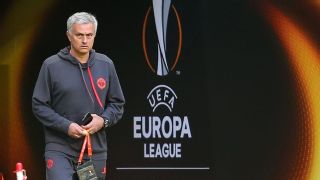|
There are certain figures in public life who can execute shameless U-turns and whose past words can be used to condemn them. They are not just confined to politics, either. Manchester United manager Jose Mourinho is the potential Europa League winner who did not want to win the Europa League. He was unequivocal about it. "I don't want to win the Europa League," he said in 2013. "It would be a big disappointment for me." That was four years ago. Opinions can change. But Mourinho's opinion hadn't changed by September 2016. "It is not a competition that Manchester United wants," he said then. "It is not one I want." If circumstances have brought an about-face and Mourinho is the critic turned convert, the sceptic may soon seem a trailblazer. If United beat Ajax in Stockholm, return to the Champions League, and reclaim their status as annual qualifiers, their foray into the lesser continental competition may appear an anomaly in their history. Lose in Sweden, and United will return to the Europa League, presumably showing more determination from the start to win it. Even if not, Mourinho could set a trend -- another one. Whether prioritising the League Cup or starting a title race at speed, both hallmarks of his success at Chelsea, the Portuguese has been a pioneer. Others have followed his lead. United's unexpected fondness for Thursday night football could prove contagious. Their Premier League peers might want to win the Europa League. United might herald a second era of English enthusiasm for the competition (in its previous guises, it was known as the UEFA Cup and the Fairs Cup). Perhaps, some on Merseyside might argue, Jurgen Klopp beat Mourinho to it. Liverpool's captivating surge toward the Europa League final 12 months ago may have kicked off a renewed interest in a competition disparaged among fans and press; some clubs appeared to be in a private battle to exit it quickest. Certainly, the carrot of Champions League qualification looks to be the game-changer UEFA intended when they made it part of the prize for winning the Europa League. Factor in the greater congestion at the Premier League summit, which owes something to Tottenham's transformation from pretenders to contenders, and others may adopt Mourinho's realistic attitude that the easiest way back into the Champions League is via the Europa League. Mourinho has a mathematical mind. He knows six into four won't go; the domestic elite cannot all qualify for the Champions League via the top four. As Arsenal manager Arsene Wenger, whose economics degree gives him a grasp of the numbers, has discovered, 75 points was not enough for a top-four finish. When the bar has been raised domestically, Europe offers an alternative way of achieving goals. Europa League success would be a way for the Premier League to justify one of its boasts. It has not produced the best teams in Europe for almost a decade -- even Chelsea's 2012 Champions League win had the air of an inspired fluke -- but it is often described as the most competitive top division on the continent. The notion that England has the greatest strength in depth seemed misguided when Sevilla won the Europa League every year. But the Prem ought to be sending more powerful sides into the Europa League than any other domestic division. Certainly no other fifth- and sixth-place teams have the transfer and wage budgets of Arsenal and United, with a combined expenditure of around £250 million last summer and almost £400 million in salaries in the 2015-16 season. They have bigger squads -- despite Mourinho's claims to the contrary -- and hugely expensive reserves. They have enviable resources and players of pedigree. There should always be at least two potential winners among the English representatives. The depth of English football and the strength of its supporting cast has been displayed in the past, long before squad rotation became fashionable. Over a period of 17 seasons from 1967 to 1984, England supplied eight Fairs or UEFA Cup winners and a further four runners-up. Tottenham and Liverpool won it twice each, while Leeds, Newcastle, Arsenal and Ipswich won once apiece. It bears comparison with a wretched record since English clubs were readmitted to Europe in 1990 after a five-year ban due to the rioting and deaths at Heysel Stadium before the 1985 European Cup final: In the subsequent 25 seasons, they mustered only two UEFA Cup wins, courtesy of Liverpool in 2001 and Chelsea in 2013. Only five of the 50 finalists were English, with Arsenal losing in 2000, Middlesbrough in 2006 and Fulham in 2010. Too many others showed too little motivation, and as Fulham and Middlesbrough savoured what always appeared a unique opportunity for comparatively small clubs, only three of the superpowers reached the showpiece in two-and-a-half decades. Now two have done so in successive seasons. A change in mindset seems underway. The Europa League is the burden that can become an opportunity. Mourinho inverted the usual approach, prioritising the secondary European competition instead of the Premier League. He might be the improbable role model, the manager who discovered that, after starting a season slowly and seeing his top-four chances recede, a competition with many mediocre sides provides the chance to muddle through to the latter stages before making a concentrated effort to win it. It is the most pragmatic and least romantic pursuit of glory, but the Special One who arrived in the Premier League as a Champions League winner may reshape English football again. Just not in the way he imagined a few months ago, let alone a few years back.
|

